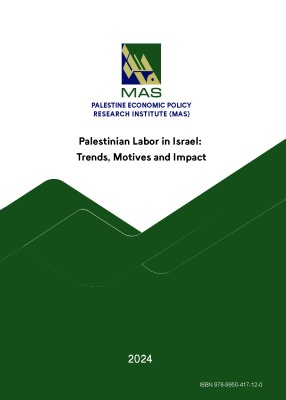Palestinian Labor in Israel: Trends, Motives and Impact (Summary)
This study identifies the key features of Palestinian labor in the Israeli economy: its trends, motives, and impact, in order to pinpoint the issues and factors that govern the future prospects and potential of this labor pool in the Israeli economy. This research delves into the fundamental motives influencing the supply of Palestinian labor in the Israeli economy; and demand by Israel for this labor. The study outlines the consequences of this phenomenon on economic conditions in the Palestinian territories occupied in 1967.
The study shows that the historical context of the issue of Palestinian labor since the occupation of 1967 is one of de facto or enforced annexation to the Israeli economy, isolating this labor pool from its Arab surroundings and exploiting its cheapness. Moreover, policies of dispossession and impoverishment practiced by the Israeli occupation caused the further erosion of activity in productive sectors, suffocating the ability of the local economy to generate gainful job opportunities for its workforce, further entrenching the dependence of Palestinian labor on the Israeli labor market. Despite the signing of the Oslo Accords, this dependence has remained a reality to this day, underlining the occupying state’s failure to adhere to these agreements.
Regarding supply and demand, the study reviews the economic conditions that led to a decline in the productive sectors, especially agricultures and industry, over the past few decades. This decline in the productive sectors resulted in a rise in unemployment, leading to the ‘migration’ of Palestinian workers from the West Bank and Gaza Strip to the Israeli labor market. Israel’s policies transformed the occupied Palestinian territories into something akin to the ‘the ‘backyard’ of’ of the Israeli economy, accessing cheap Palestinian labor without affording it the legal rights associated with employment in labor-intensive Israeli sectors, especially construction and agriculture. While the dependence of the occupied Palestinian territories on the Israeli labor market deepened, the Israeli construction and agricultural sectors in themselves became increasingly dependent on Palestinian labor.

